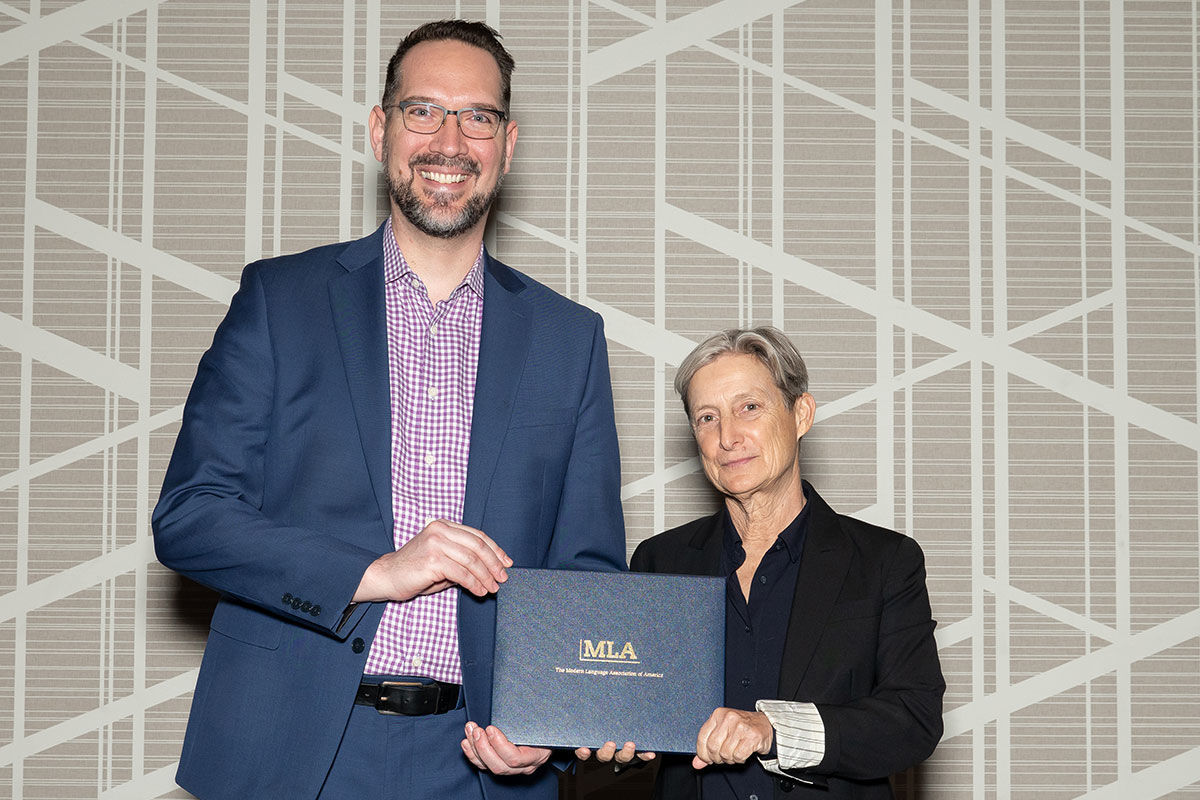
David Lummus received the Aldo and Jeanne Scaglione Publication Award for a Manuscript in Italian Literary Studies at the MLA’s annual convention in Seattle last month.
David Lummus, assistant director of the Notre Dame Center for Italian Studies and the Devers Family Program in Dante Studies, has won an award from the Modern Language Association of America for his manuscript about the poet’s role as an authority in the political arena in the 14th century.
Lummus accepted the Aldo and Jeanne Scaglione Publication Award for a Manuscript in Italian Literary Studies at the MLA’s annual convention in Seattle last month for The City of Poetry: Imagining the Civic Role of the Poet in Fourteenth-Century Italy (Cambridge University Press, 2020).
In the book, Lummus’ first, he examines how Albertino Mussato, Dante Alighieri, Francesco Petrarch, and Giovanni Boccaccio viewed the importance of poetry.
“They defended poetry as a kind of theology,” Lummus said. “I wanted to understand what was going on culturally and historically to push them to say poetry was on par with theology. Their works were a product of these individuals’ genius engaging with what was happening around them.”
Dante (1265–1321) is the best known of the four, writing the Divine Comedy, a poetic trilogy considered one of the masterpieces of Italian literature. Mussato (1261–1329) was a contemporary of Dante, but isn’t as well known because he wrote in Latin and was focused on the local situation in his hometown of Padua. Petrarch (1304–1374) was a lyric poet known for Il Canzoniere and the first poet laureate of Rome after antiquity. Boccaccio (1313–1375) wrote the Decameron, a collection of stories about a group of young people trying to escape the ravages of the plague.
“From today's perspective, the medieval defense of poetry intersects with the defense of the humanities in crisis. What is the value of studying literature? What is the value of studying history? These poets, call them public intellectuals if you want, were trying to answer very similar questions, in an effort to establish the value in society of studying literature, studying ancient history. I think that makes their story relevant to us.”
“Each of them, in one way or another, was not able to achieve the institutional status that they desired,” Lummus said. “Dante was in exile, for example, and he wasn't able to participate in the political reality of Florence. So he invented a way in which he could speak authoritatively in the public arena through his poem. Thanks to poetry, all four of these men found ways of engaging with civic bodies in which they didn’t have institutional authority.”
Lummus said it was a time of increasing professionalization in certain disciplines, such as law and medicine.
“It’s a unique period because of the succession of extraordinary individuals who are trying to do something very similar with poetry in different contexts,” Lummus said. “From today's perspective, the medieval defense of poetry intersects with the defense of the humanities in crisis. What is the value of studying literature? What is the value of studying history? These poets, call them public intellectuals if you want, were trying to answer very similar questions, in an effort to establish the value in society of studying literature, studying ancient history. I think that makes their story relevant to us.”
The MLA has more than 25,000 members in 100 countries who work to strengthen the study and teaching of languages and literature. The committee that selected Lummus’ manuscript for the award said it “establishes a coherent, nuanced, and tightly framed argument, developing a lucid and well-focused narrative that reads like a story, and it contributes significantly to present-day critical debates on the role of the poet as an authority in society.”
Lummus, who earned his Ph.D. in Italian from Stanford University and was previously on the faculty at Stanford and Yale, said he was attracted to Notre Dame two years ago because of its strong Italian studies program.
Notre Dame has one of the largest Dante collections in North America, and the William and Katherine Devers Endowment for Excellence in Dante Studies was established at the University in 1995. Notre Dame in 2018 created the Center for Italian Studies, which coordinates all Italy-related activities and events at Notre Dame.
“This is an exciting place to be because of all that is going on,” he said. “Italian studies has been an essential part of the University culture for a very long time.”


